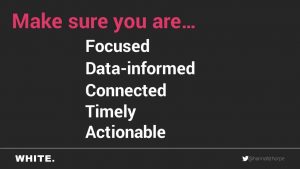This article was written based on a Digital Olympus presentation given by Hannah Thorpe, you can view the full slides here. Originally posted on white.net
There’s a big difference between strategy and tactics. If you find yourself always changing your planned activities and find your marketing has become reactive, rather than proactive, then it’s likely you’re too focused on the granular tactics. This presentation covers how to determine a quality strategy, empower your team/agency to make smart decisions and follow the overall direction of your marketing mission. Creating more effective, impactful SEO strategies.
Real words, not just buzzwords
GAP analysis, innovation, marketing objectives, roadmapping and various other marketing strategies are important, but the end result for all of them needs to be understood. There’s a whole world of tactics we could talk about, but instead, it’s about how we explain them and the end result we are working towards.
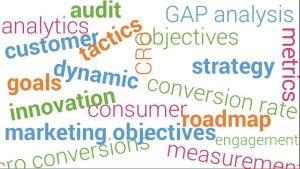
We want brands to be ‘human’, yet we don’t communicate like we are working with people. If we don’t speak the same language as our target audience then it’s really just noise. It’s fine having the expertise but not being able to voice these skills makes them almost redundant.

The starting point: Define what we do
First of all, we need to understand exactly what we do as a business. What are the things we’re trying to achieve? Who are we trying to speak to? It’s at this point, we define or:
- Strategy – a plan of action designed to achieve a long-term or overall aim.
- Tactics – the tools you use to pursue a chosen strategy.
- Goals – the broad outcomes which you are trying to achieve with your strategy.
- Objectives – The measurable steps required in order to achieve the strategy

Time to test your ‘strategicness’
To work out what your strategy should be for your business, it’s about understanding what your vision is. Do you have a grasp of what success looks like? What are your bigger objectives? How does this tie-in to everything else you do? What are your competitors doing and why? And it’s important to keep your overall goal simple to empower individuals. If there’s one clear overall goal, the team will work together to achieve this using their natural ingenuity and knowledge.
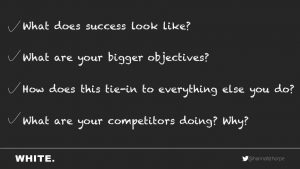
Are you data-informed?
Data is imperative for understanding current performance and for coming up with realistic, tangible objectives you can hit. So, ask yourself, which metrics are you trying to impact? What are your KPIs and next best actions? Is it trackable? What isn’t trackable? Do you know what has worked historically and where? Use data to monitor how well a strategy is impacting your brand so you can adapt to meet your end goal.
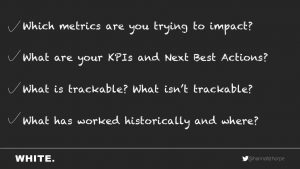
Is your strategy connected?
Once you’ve done the research, looked at the numbers and understood your goals, now it’s time to understand how you will deliver this content. So, ask yourself more questions. Do you have the right expertise to write the content? Do you really understand the audience and what they want? How does this relate to the other content in your space?
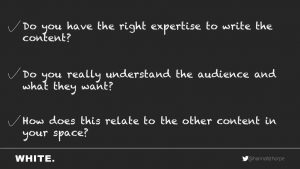
Use tools like YouGov Profiles Lite to understand exactly the type of person you’re targeting. What are their favourite dishes? Which are their hobbies? Do you know their favourite sports? Any other general interests they may have? Niche interests? Creating this virtual persona will give you a real-life person to target with your content.

Is your strategy timely?
Not only is targeting the right audience key to producing engaging content, the title being topical also a big draw. Before scheduling the content plan, ask yourself what impact seasonality has on it. Is your idea evergreen or transient? Are you just trend-jacking And how will this content seem retrospectively?
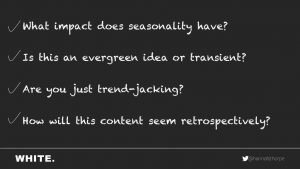
You can look at it two ways; create big spikes on specific days or create consistently good-performing content throughout the year. Websites like Days of the Year list the most popular days, which is a great source for seasonal blog titles. Otherwise, understanding which search queries perform well throughout the year will allow you to have a good source of evergreen content.

Is your strategy actionable?
It’s fine having great analysis, but this needs to be put into action. Work out if you have the resource to implement this. Will you be able to get sign-off? Is this really achievable? Can competitors duplicate it better than you? Everything you strategize needs to be realistic and have an end result that will positively impact the brand.
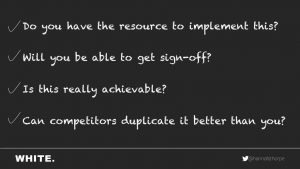
Understand the people around you
It doesn’t matter how big or small your team is, understanding each and every one of them is imperative for a good working environment. Every team member will have different skills, comfort zones and mindset on certain tasks. Making sure you create your strategy around the people delivering the work is imperative for the most efficient and high-quality outcome.

Key takeaways
- Always stay focused
- Be data-informed
- Stay connected
- Make your strategy timely
- Make sure everything is actionable
